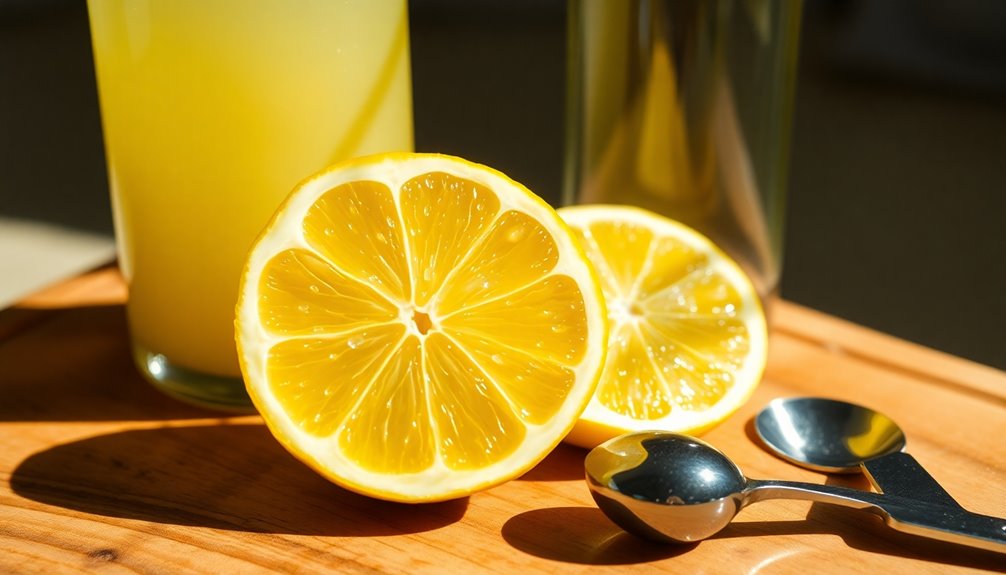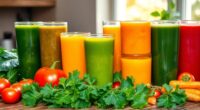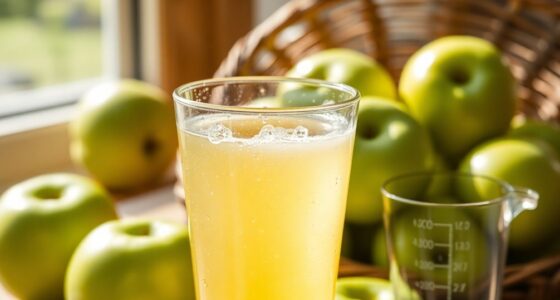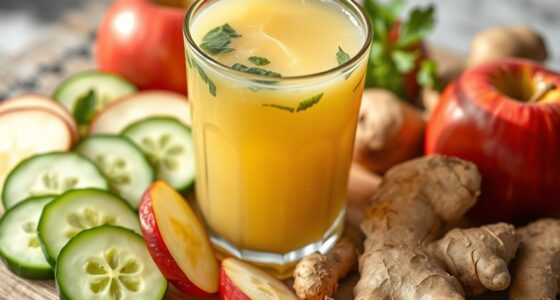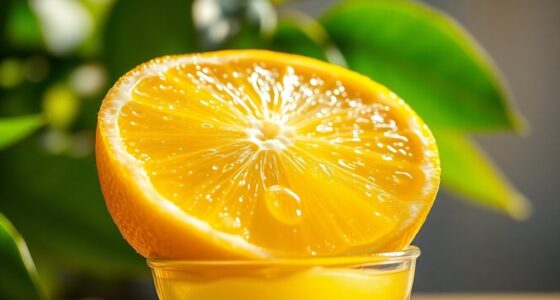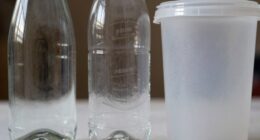If you're wondering how much bottled lemon juice equals one fresh lemon, the truth is one lemon gives you about 2 to 3 tablespoons of juice. If you need a quick fix, one tablespoon of bottled lemon juice can substitute for one tablespoon of fresh. However, keep in mind that bottled juice often lacks the vibrant flavor of fresh. Interested in more tips on maximizing lemon juice in your cooking? There's plenty more to discover!
Key Takeaways
- One medium lemon yields about 2 to 3 tablespoons of fresh lemon juice.
- One tablespoon of bottled lemon juice is equivalent to one tablespoon of fresh lemon juice.
- Bottled lemon juice often contains preservatives, impacting flavor compared to fresh juice.
- For a quick substitute, use one packet of True Lemon for one tablespoon of fresh lemon juice.
- Fresh lemon juice significantly enhances flavor, while bottled options may taste artificial.
Understanding Lemon Juice Measurements
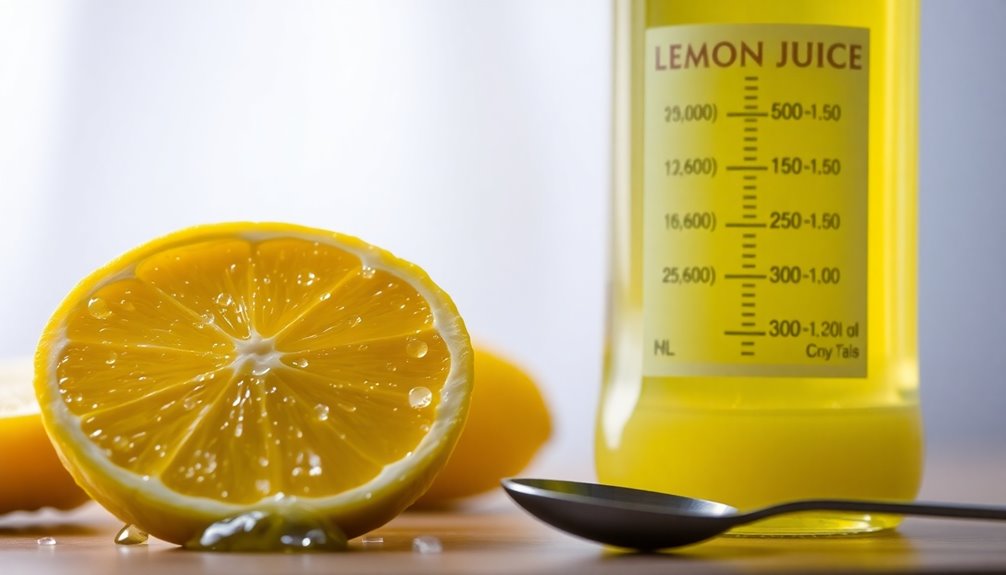
When you're measuring lemon juice for your recipes, it's essential to know the differences between fresh and bottled options.
If you're using bottled lemon juice, remember that one packet of True Lemon is equivalent to 1 tablespoon of fresh lemon juice. For concentrated lemon juice, the measurement is straightforward: 1 tablespoon equals 1 tablespoon of fresh juice.
However, keep in mind that bottled lemon juice often contains preservatives, which can change the flavor profile. Always check your recipes for specific measurements, as they might require you to adjust the acid content based on the type of lemon juice you're using.
This way, you'll guarantee your dish turns out just right, capturing the essence of fresh lemon when possible.
Fresh vs. Bottled Lemon Juice: A Flavor Comparison
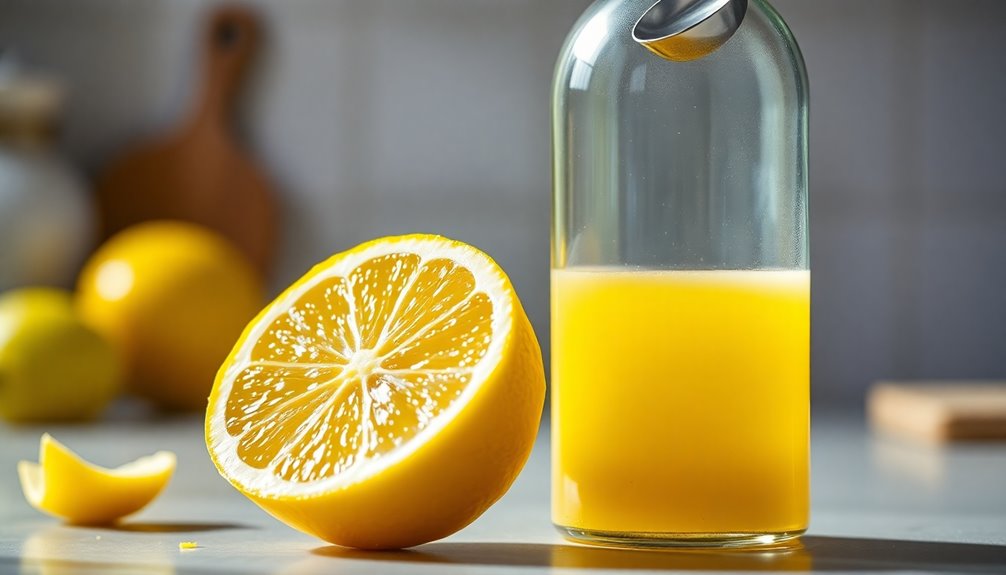
When it comes to flavor, fresh lemon juice packs a vibrant punch that bottled juice simply can't match.
You'll find that dishes and drinks made with fresh juice taste more balanced and enjoyable, while bottled options often come off as harsh and artificial.
If you want to elevate your cooking and cocktails, opting for fresh lemon juice is the way to go.
Fresh Juice Flavor Profile
Although both fresh and bottled lemon juice serve similar culinary purposes, their flavor profiles diverge markedly.
Fresh lemon juice offers a strong sour flavor with a hint of sweetness, creating a vibrant taste that elevates your dishes and drinks. The fresh juice flavor profile is authentic and bright, enhancing everything from salads to desserts.
In contrast, bottled lemon juice often contains preservatives, leading to an artificial taste that lacks the depth of fresh lemons. Taste tests reveal that pies made with fresh juice have a delightful lemon flavor, while those using bottled juice can taste overwhelmingly like lemon oil.
For superior taste and improved texture in baked goods, fresh lemon juice is the clear winner.
Bottled Juice Taste Issues
While you might reach for bottled lemon juice for convenience, it often falls short in flavor compared to its fresh counterpart.
Fresh lemon juice delivers a vibrant, tangy taste with a hint of sweetness, enhancing your dishes and drinks. In contrast, bottled lemon juice can taste artificial, often reminiscent of lemon flavoring rather than the real thing.
Taste tests reveal that desserts made with fresh juice have a delightful, authentic flavor, while those using bottled juice may come off as harsh or overly reminiscent of cleaning products.
Additionally, bottled lemon juice can contain preservatives like sodium metabisulfite, which further alters its taste.
For a truly invigorating experience, fresh lemon juice remains the clear winner in flavor.
Cooking Applications Preference
The choice between fresh and bottled lemon juice can greatly impact your cooking results, especially when it comes to flavor. Fresh lemon juice delivers a vibrant, authentic taste that elevates your dishes and desserts.
Taste tests reveal that pies made with fresh juice have a delightful, natural flavor, contrasting sharply with the often harsh taste of bottled varieties.
Consider these benefits of using fresh lemon juice:
- Enhances flavor balance in cocktails like the French 75.
- Improves the taste of baked goods, making them more enjoyable.
- Avoids the artificial taste and preservatives found in bottled options.
Switching to fresh lemon juice not only boosts your culinary creations but also guarantees a superior flavor experience.
The Importance of Fresh Lemon Juice in Cooking
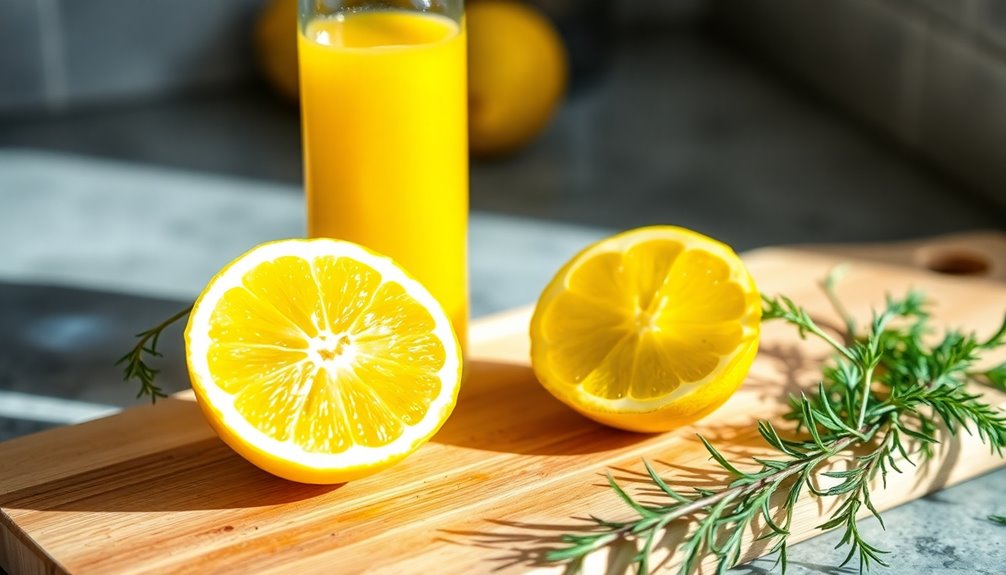
When you cook, using fresh lemon juice can truly elevate your dishes and beverages. Its vibrant flavor and natural acidity enhance the taste, making everything from marinades to cocktails sing with freshness.
Unlike bottled varieties, fresh lemon juice doesn't contain preservatives, ensuring your recipes maintain their authentic quality. One fresh lemon yields about 2 to 3 tablespoons of juice, perfect for balancing sweetness in baked goods or adding zest to savory dishes.
Taste tests consistently show that fresh lemon juice delivers a more pleasant flavor than bottled alternatives. Plus, its acidity is essential for canning, helping to inhibit harmful bacteria.
For the best culinary results, always reach for fresh lemon juice when cooking!
How to Measure Lemon Juice Accurately
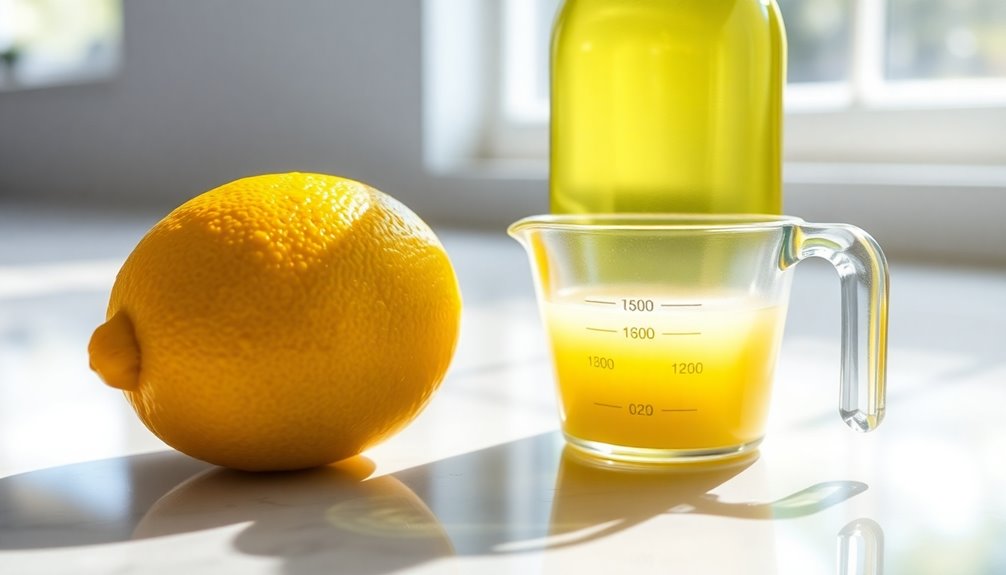
Measuring lemon juice accurately is essential for achieving the right balance in your recipes.
If you want to guarantee you're using the correct amount, here are a few tips:
- Use a measuring spoon instead of estimating the amount of lemon juice.
- Remember that one medium lemon typically yields about 2 to 3 tablespoons of juice.
- One True Lemon packet is a handy substitute, equating to 1 tablespoon of fresh lemon juice.
When you use bottled lemon juice, keep in mind that 1 tablespoon of concentrated juice equals 1 tablespoon of fresh juice.
Canning and the Role of Acidification
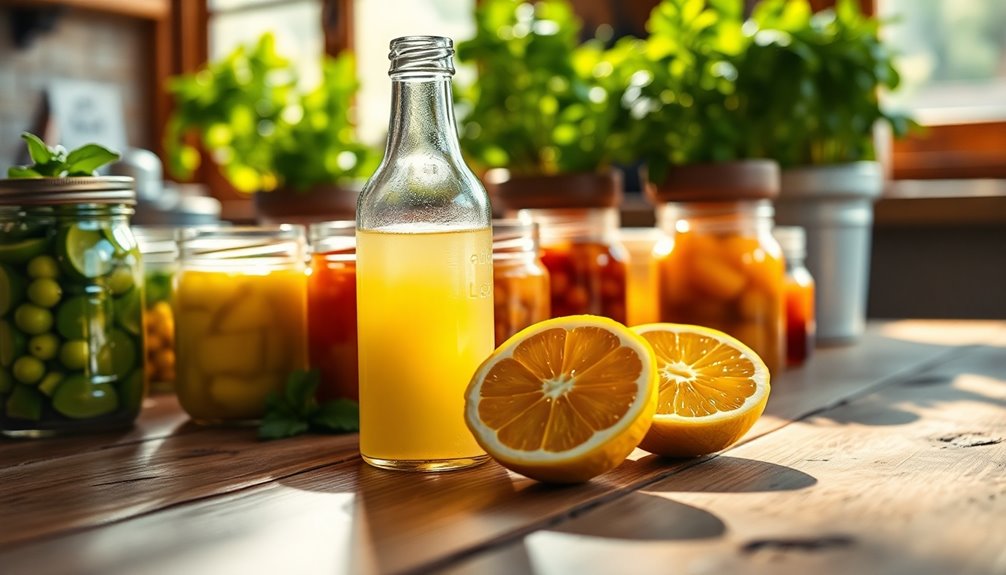
Understanding the importance of acidification in canning can markedly enhance your food preservation efforts.
Acidification is essential to inhibit the growth of botulism spores, keeping your canned goods safe. Aim for a pH of 4.6 or lower, and you'll typically use lemon juice or citric acid for this purpose.
For instance, adding 1/4 teaspoon of citric acid per pint of canned tomato products is recommended. Recipes designed for canning often specify lemon or lime juice due to their reliable acidity levels.
Remember, substituting vinegar for citric acid isn't safe. Always follow tested recipes to maintain proper acidity and avoid spoilage or foodborne illness. Additionally, using cold-pressed vegetable juice can provide a nutrient-rich alternative for enhancing flavor in your recipes.
With the right acidification, you can enjoy your preserved foods with peace of mind.
Substituting Citric Acid for Lemon Juice
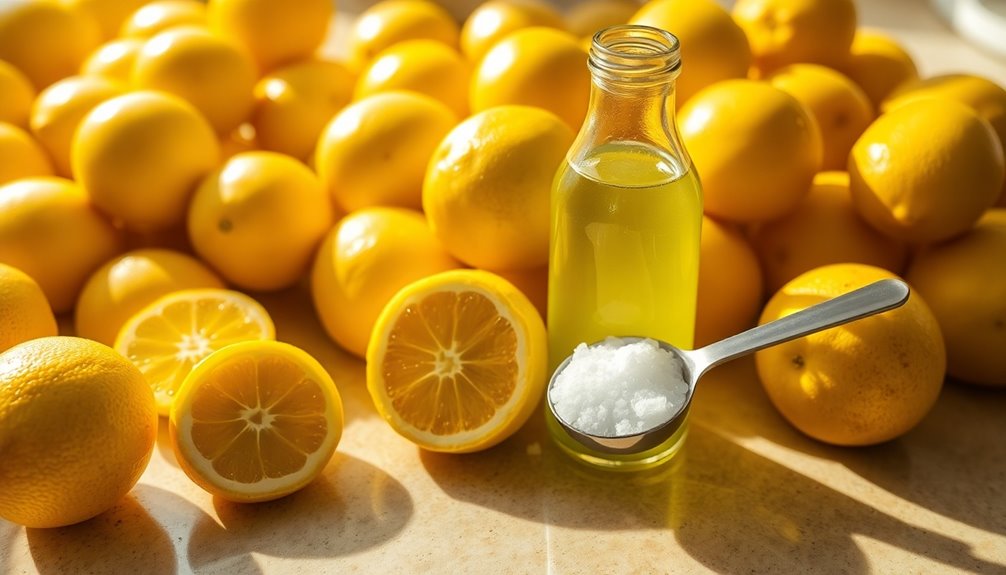
For those looking to preserve their food safely, substituting citric acid for lemon juice can be an effective option. You can use 1/4 teaspoon of citric acid for every tablespoon of lemon juice in recipes.
When canning, it's recommended to use 1/4 teaspoon of citric acid per pint to guarantee proper acidity and safety.
Here are some tips to keep in mind:
- Adjust sweetness with sugar or honey to balance the flavor.
- For smaller jars, reduce the amount to 1/8 teaspoon for 4 oz jars.
- Always follow tested canning recipes to guarantee safety.
Taste Testing: The Impact on Recipes
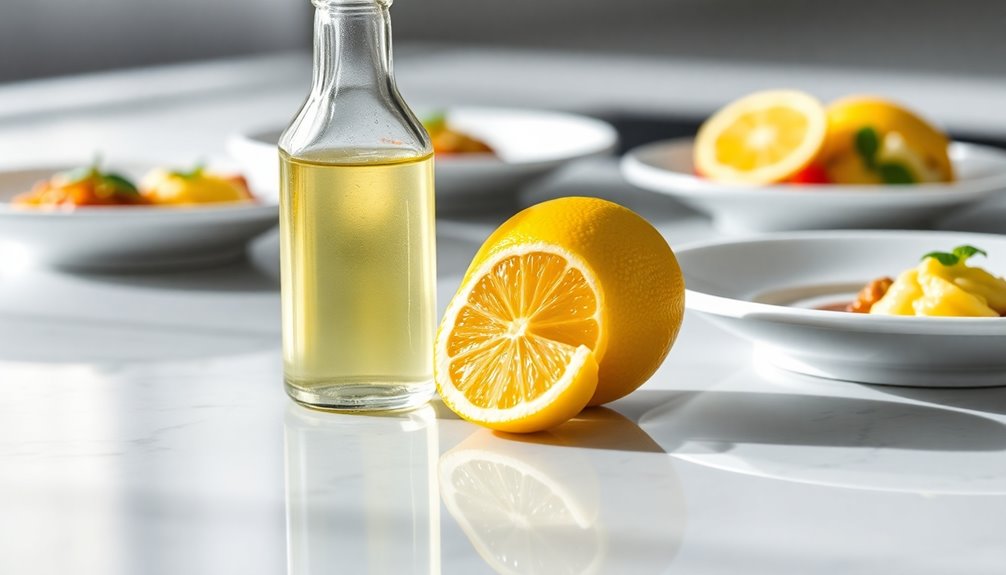
When you taste-test recipes, you'll quickly notice the stark difference between fresh lemon juice and bottled alternatives.
Fresh lemon juice brings a bright, authentic flavor that elevates your dishes, while bottled juice often leaves an artificial aftertaste.
If you're looking to adapt your recipes for the best results, sticking with fresh lemon juice is a game-changer.
Fresh vs. Bottled Flavor
Taste testing reveals a striking difference between fresh and bottled lemon juice, especially in recipes. Fresh lemon juice delivers a vibrant, authentic flavor that elevates your dishes, while bottled alternatives often taste artificial.
For instance, cocktails made with fresh lemon juice, like a classic French 75, boast a well-balanced profile, unlike the harsher taste of those made with bottled juice. Similarly, lemon chess pies shine with genuine flavor when you use fresh lemon juice, while bottled versions can overwhelm with an artificial taste.
- Fresh lemon juice enhances cocktails and desserts.
- You'll notice a textural difference in your pies.
- Recipes thrive on the authentic flavor of fresh ingredients.
Additionally, using fresh lemon juice can enhance the overall experience of dishes like Turkey Bean and Tomato Zoodle Bowl, which rely on vibrant flavors.
Choosing fresh lemon juice truly transforms your culinary creations!
Recipe Adaptation Tips
Using fresh lemon juice instead of bottled juice can considerably elevate your dishes, transforming their flavor and authenticity.
Fresh lemon juice offers a vibrant taste that bottled lemon juice concentrate simply can't match. When adapting recipes, remember that 1 tablespoon of bottled juice equals the juice from one medium-sized fresh lemon, making substitution easy.
Taste tests reveal that fresh lemon juice enhances the overall flavor profile, particularly in baking; pies made with fresh juice are often preferred over those with bottled alternatives.
If you're using citric acid instead of fresh juice, consider adding a bit of sweetener to balance the flavor. This small adjustment can considerably improve your dish's taste and guarantee it shines. Additionally, using fresh ingredients like lemon can contribute to a healthier lifestyle by promoting cleanliness and hygiene in your cooking environment.
Recommendations for Using Lemon Juice in Cooking
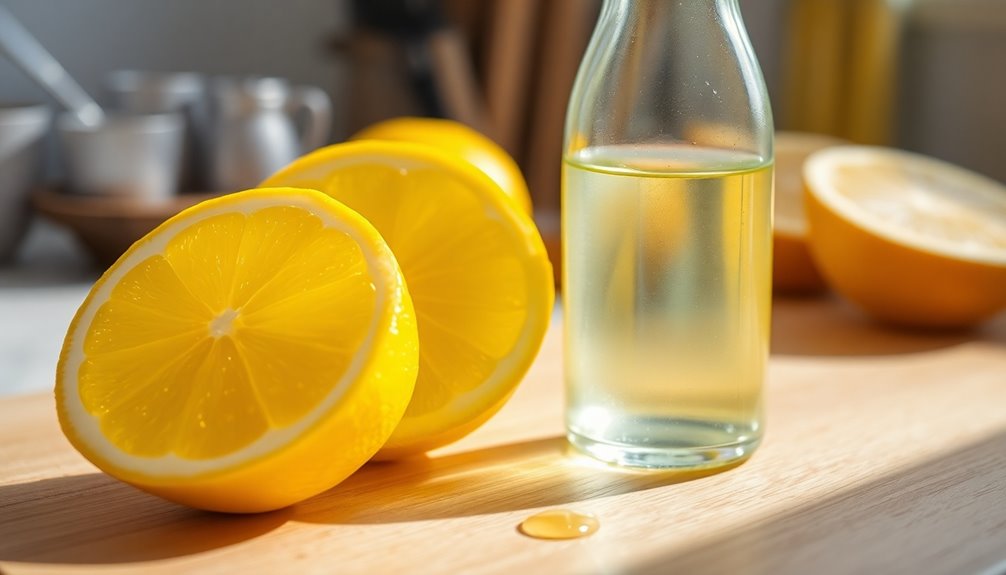
- Use 1 tablespoon of fresh lemon juice per pint when canning tomatoes to guarantee safety.
- Substitute a packet of True Lemon for 1 tablespoon of fresh lemon juice in your recipes.
- Experiment with lemon juice in marinades and sauces for an extra zing. Additionally, incorporating lemon juice can enhance the flavor of green tea and boost its antioxidant absorption.
Frequently Asked Questions
How Much Bottled Lemon Juice Equals Fresh Lemon?
If you're wondering how much bottled lemon juice equals fresh lemon, it's pretty simple.
One tablespoon of bottled lemon juice can replace the juice from one fresh lemon. If you're using a concentrated variety, you can still use a one-to-one ratio—one tablespoon of concentrated juice equals one tablespoon of fresh.
However, keep in mind that fresh lemon juice often offers a better flavor, so don't hesitate to squeeze those fresh lemons when you can!
How Much Bottled Lemon Juice Equals the Zest of One Lemon?
You might think bottled lemon juice can easily substitute for lemon zest, but it falls short in flavor.
For zest from one lemon, you won't find a direct equivalent in bottled juice. Instead, you can use about 1 tablespoon of bottled lemon juice combined with a few drops of lemon extract.
This blend can somewhat mimic the zest's flavor, but remember, nothing beats the fresh zest's aromatic qualities in your recipes.
How Much Lemon Juice Is Equivalent to One Lemon?
When you’re figuring out how much lemon juice equals one fresh lemon, you’ll find that a medium lemon typically yields about 2 to 3 tablespoons of juice. To get a precise measurement, it’s always a good idea to juice the lemon yourself, as size and juiciness can vary. If you need to replace lemon juice in a recipe and are unsure how much juice from one lemon to use, remember that you can also adjust based on your taste preferences. Always taste your dish as you go to achieve that perfect balance of tartness and flavor.
So, if a recipe calls for the juice of one lemon, you can substitute it with about 2 tablespoons of bottled lemon juice.
Just keep in mind that fresh juice often offers a better flavor than bottled options, enhancing your dishes more effectively.
Can You Substitute Concentrated Lemon Juice for Fresh Lemon Juice?
When life hands you lemons, sometimes you gotta make do! Yes, you can substitute concentrated lemon juice for fresh lemon juice.
They're interchangeable in a 1:1 ratio, meaning 1 tablespoon of concentrated juice equals 1 tablespoon of fresh.
However, keep in mind that fresh juice usually packs a brighter flavor. If you're after that zesty punch, squeezing a fresh lemon is your best bet.
Just check your labels for any specific dilution instructions!
Conclusion
In your culinary adventures, remember that while bottled lemon juice can be a convenient alternative, it often falls short of the vibrant flavor fresh lemons offer. Don't let your dishes suffer the fate of mediocrity; always aim for the zest of freshness. In a world where convenience reigns supreme, take a moment to appreciate the simple elegance of a freshly squeezed lemon. Your taste buds will thank you, and your recipes will shine like a fine vintage.
Susannah expertise lies in researching and compiling evidence-based content on juicing, nutrition, and overall health. She is committed to ensuring that The Juicery World offers accurate, up-to-date, and trustworthy information to empower readers to take control of their health. Susannah’s goal is to inspire individuals to embrace juicing as a way to nourish their bodies and live their best lives.

